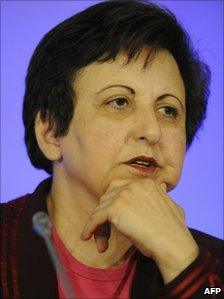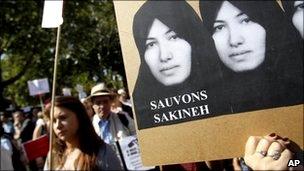Iran fails to get seat in UN women's rights agency
- Published

Ms Ebadi said admitting either Iran or Saudi Arabia would be "a joke"
Iran has failed to obtain a seat on the board of a new UN super-agency for women's rights, after fierce opposition from the US and human rights activists.
However, Saudi Arabia, which also faced protests from rights groups, secured a seat.
Iran had initially been guaranteed a seat as there were no competitors, but East Timor later proposed itself and won the place instead.
The new agency, known as UN Women, merges four existing bodies.
Human Rights Watch had said that admitting either Iran or Saudi Arabia would send the wrong signal to women around the world given their poor rights records.
Iranian Nobel Peace Prize laureate Shirin Ebadi said that membership of countries like Iran and Saudi Arabia on the board was "like a joke".
Iran drew international condemnation recently after sentencing a women to death by stoning for adultery.
And a General Assembly resolution last year noted "deep concern" over Iran's increasing use of executions, torture, flogging and amputations, and discrimination against minorities.
Meanwhile, activists highlighted Saudi Arabia, where women are not allowed to drive and are barred from many facilities used by men.
'Less than stellar'
Libya and Congo also received criticism from rights groups after winning uncontested seats on the board.

Iran's decision to sentence a women to death by stoning sparked international protests
US Ambassador Susan Rice said the US was pleased with the outcome after Iran lost at the ballot.
"I am not going to deny that there were several countries that are going to join the board of UN Women that have less than stellar records on women's rights, and indeed human rights," she added.
In the election at the 54-nation UN Economic and Social Council, Iran received the lowest number of votes of the 11 nations, which were vying for 10 seats.
Iran garnered 19 votes compared to 36 for East Timor.
The General Assembly resolution adopted in July brings together four UN bodies that deal with women's issues into one to improve gender equality.
- Published9 November 2010